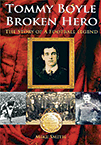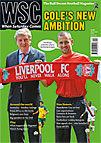 The story of a football legend
The story of a football legend
by Mike Smith
Grosvenor House, £11.99
Reviewed by Alan Tomlinson
From WSC 306 August 2012
Until 2004, when Arsenal’s “Invincibles” went unbeaten through a full Premier League season, Burnley held the record for the longest undefeated run in a single season of England’s top tier. This small-town Lancashire club avoided defeat for 30 successive League games, going on to take their first championship in 1921. At the heart of this achievement was a gritty, combative Yorkshire-born midfield dynamo of Irish Catholic parentage, Tommy Boyle.
Mike Smith’s compellingly related and minutely researched biography of Boyle makes some of Burnley’s championship-winning heroes of 1960 look like pampered softies alongside this tough player, who dominated Burnley’s fortunes either side of the Great War. Boyle was a mere 5ft 7in but dominated the teams he led with a physical and psychological presence that willed his team-mates to victory. He cajoled, bullied and consistently inspired the players at Burnley, and before that at Barnsley, to the highest levels of competitive performance.
Boyle worked as a miner from the ages of 12 to 20, before signing professional terms for Barnsley. He took them to an FA Cup final against Newcastle, before a move to Burnley, who he led to Cup and League success. He was wounded in service in France, called back into action, then resumed the captaincy at Burnley, where eight of the 1914 Cup-winning team reunited for the 1920-21 triumph. For a time, Boyle had it all: the adulation of the “lasses” of the Lancashire mill-town (one of whom he married), money way beyond the reach of working men, the status of the local hero, acceptance and patronage of the local elite.
But the peak of 1921 was achieved in a climate of post-war industrial decline, and as his ageing body became less able to cope with the wear and tear of the top-flight game, his world fell apart. Fiery and brief spells as a trainer at Wrexham and then in Berlin were followed by the collapse of his marriage (after the tragic loss of an only child), unemployment and drink-fuelled aggression and violence. Boyle was committed to the local asylum under the new Mental Health Act of 1930, where he died after almost eight years of incarceration, aged 53.
This is a tragic story told well and with much revealing detail. Smith draws on an impressive range of sources in conveying this connection between the life of a community and the decline of one of its local heroes. The attribution of thoughts and reflections to Boyle is not always convincing, and some parts of the narrative are, as Smith concedes in a disclaimer, based on anecdote and the author’s imagination.
It is a long read, with match reports and lists of names that can jar the narrative flow. But Smith is to be congratulated for bringing alive a figure so typical of the fluctuating fortunes of early professional footballers, for whom the problems of adjustment after the glories of playing days so often proved insurmountable. Boyle’s story is no mere historical curiosity; reading this haunting tale, I was repeatedly reminded of Paul Gascoigne’s life after the magic was gone.


